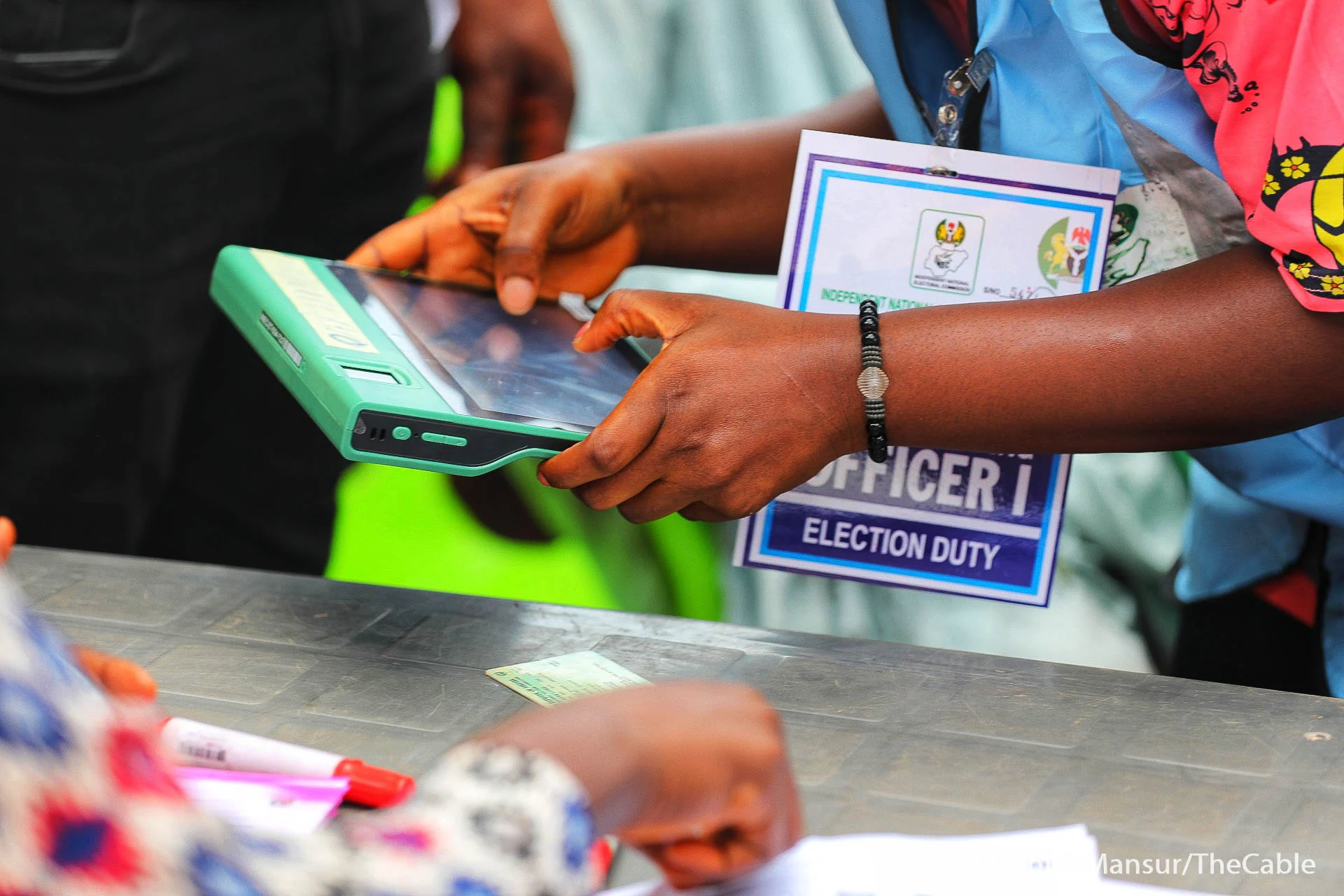2023: INEC’s failures and “substantial compliance’’
Indisputably, the Independent National Electoral Commission (INEC) owes the nation an apology. They have had four years in which to improve their performance and organize a free and fair 2023 election, yet apart from introducing the problematic Bimodal Voter Accreditation System (BVAS), nothing improved! INEC’s televised collation and presentation of results is a shameful shamble. […]

BVAS in use
Indisputably, the Independent National Electoral Commission (INEC) owes the nation an apology. They have had four years in which to improve their performance and organize a free and fair 2023 election, yet apart from introducing the problematic Bimodal Voter Accreditation System (BVAS), nothing improved! INEC’s televised collation and presentation of results is a shameful shamble.
Quite shockingly, university lecturers, acting as INEC ad hoc staff, recited multiple single digits as totals, rather than carry out the simple task of reading out complete numbers and adding them up correctly. In addition, many returning officers reported malpractices in their areas, while party agents protested massive disenfranchisement of voters due to non-functional BVAS machines at polling booths or the non-appearance of INEC staff.
Nigerians are left to ponder as to what exactly INEC staff have been doing while collecting monthly salary for the past four years! In the past, the nation has survived shabbily organised, shambolic elections, and there is no reason to assume it will not survive this one! Lamentably, the repeated failure of INEC chairmen to get things right comes as no surprise. They fail to grasp that the biggest culprits in election malpractice are INEC staff themselves! The lack of basic logistics is a routine INEC shortcoming, to which failure to promptly upload results due to an undefined “technical glitch” has been added. Political analysts say Nigeria can only prosper if elections are free and fair”, ironically if one thing can be said with all certainty it’s that the INEC has proved serially incapable of conducting free and fair elections.
Both local and foreign election observers were caught up in the mess and recorded it on film, bringing the nation once again into disrepute. Several of the many other malpractices and inefficiencies are noteworthy. The Labour Party’s logo was missing in some ballot papers in Lagos State; an INEC staff was beaten to a pulp for thumb-printing ballot papers in Abuja; touts locked the gate of the Iba Housing Estate in Lagos to prevent voters from exercising their rights; residents of Oba Elegushi area of Lagos were filmed rejoicing as military men arrived to stop the intimidation of voters who were allegedly not allowed to vote except it was for the APC presidential candidate; and worst of all, a female youth corps member was caught altering result sheets in Enugu State.
INEC’s logistical problems were unpardonable considering the amount of time they had to prepare. From routine shoddiness in the late deployment of staff and logistics, to videos of ad hoc staff altering results, to voter suppression by failure to man polling booths, and the suspicious failure to upload results directly from BVAS, INEC’s performance is massively worrisome and troubling, especially when less than one third of the qualified registered voters actually cast their ballot.
It’s inexcusable for results of the presidential election not to be uploaded immediately, as it gives rise to speculation surrounding allegations that time is needed to falsify results. INEC can only blame themselves for social media being full of unverified allegations of staff falsifying collated results and uploading them.
In truth, they had no business designing, let alone implementing, such a cumbersome, overly expensive, opaque, and easily manipulated system. The money wasted on printing ballot papers (more than half of which will not be used), the totally unnecessary issuance of Permanent Voter’s Cards, hundreds of thousands of which were never collected and were recovered from the bush or in gutters, and the printing of results sheets which are collated manually before being uploaded, indicate an inability to conceptualise a voting system which does not require the nation to be shut down and movement restricted, not require security forces to be mobilised to threaten the citizenry, not disenfranchise voters, and yet produce timely acceptable results.
As for getting to the bottom of the mess, INEC has declined to disclose the number of PVCs collected by states, local governments, or polling units, and is not releasing the number of polling booths in which elections could not hold. Logically, everywhere accreditation did not take place all the voters who registered at the polling booth are considered disenfranchised. This figure is expected to run into millions nationwide. There is little doubt that whatever the outcome of the presidential election, the result will be challenged in court.
The Supreme Court, which routinely overturns election results on the flimsiest excuse, sometimes with totally absurd judgments, has never overturned a presidential election because of the fallout it would cause. INEC should stop wasting scarce public funds on crooked, compromised elections, in the belief that afterwards the Supreme Court will acknowledge the numerous malpractices, inefficiencies and discrepancies yet conclude that the result should stand because there was “substantial compliance with the electoral law”!
